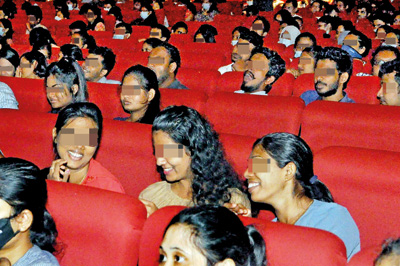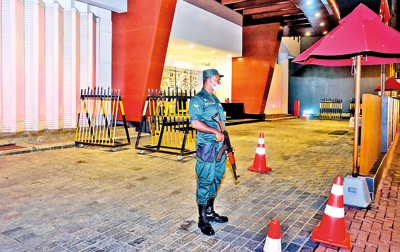News
Striking difficult balance between opening country and warding off coronavirus
The difficult decision of when to open the entry-points to Sri Lanka has not yet been finalised, while many health sources urged people to adhere to face-mask wearing, hand hygiene and physical distancing in public places.

Few masks and little social distancing: Event for medical interns in Kelaniya yesterday
With extensive discussions on how to strike a balance between opening the country and warding off the coronavirus, Airport and Aviation Services Ltd. (AASL) Vice Chairman, Rajeewasiri Sooriyaarachchi said that no decision has been taken yet.
This is as the Health Ministry’s Chief Epidemiologist, Dr. Sudath Samaraweera said that as there is a need to maintain equilibrium, the opening of entry points is being discussed at length.
“We need a thorough and well-balanced plan for the opening of the country for tourism, while ensuring that no positive cases slip through,” he said, explaining that the repatriation of Sri Lankans who wish to get back home too cannot be hurried up. The COVID-19 clusters within the country are abating and seem to be petering out, so it is mainly the returnees who are being diagnosed as positive.
“We need to bring back these Sri Lankans as this is their home while ensuring that there is no resultant community spread. This can be done by making sure that there is adequate capacity in the 70-odd quarantine centres, we have enough RT-PCR testing capability to meet the demand and also adequate hospital beds,” said Dr. Samaraweera.
This was also discussed at length at a meeting of the COVID-19 Task Force on Thursday, the Sunday Times understands, with a focus on the fact that Sri Lanka may be the only country which has opened its doors for returnees who are COVID-19 positive.
Mr. Sooriyaarachchi of the AASL said that 99 flights have arrived at the Bandaranaike International Airport (BIA), Katunayake, since August 14, of which 10 were repatriation flights (mainly SriLankan Airlines, Qatar Airways, China Eastern Airlines, Turkish Airlines and Korean Airlines) and 9 charters. The others were scheduled and transit flights. This is while there have been 60 departure flights.
When asked about foreigners coming into the country, Dr. Samaraweera said that they were either diplomats or staff working for projects here. All have to undergo the mandatory 14-day quarantine at a state-run centre or designated hotel. However, they have been given “a small leverage” for the second 14-day period of self-quarantine. During this time they can attend to their work either at the foreign missions or at the project sites but can travel only between the two points of home/hotel where they may be staying to the mission/project site and back, with no deviation.
The Sunday Times, meanwhile, learns from other sources that Heads of Mission and foreign national staff of diplomatic missions/United Nations (UN) who hold diplomatic/UN/official passports and their immediate family members are permitted to self-quarantine at their residences even for the first 14 days, subject to the supervision of the respective Heads of Mission and the local health authorities.
With regard to concerns of a Colombo hotel being closed due to COVID-19, Dr. Samaraweera said that the hotel in question is a designated quarantine centre for sea-farers and this week there were a couple of positive cases there.
“Then we follow the usual strict protocols of health staff in Personal Protective Equipment (PPE) taking the positive patients to hospital. Thereafter, the evacuated room/rooms are thoroughly disinfected and that area kept closed for three days. There is nothing to panic. What we need to ensure is that all protocols are followed. If a hotel is a quarantine centre, then it is not open to other guests or for people to access the restaurants,” he said.
In a statement on its website, Cinnamon Red Colombo stated that it is currently reserved for the exclusive use of seafaring operations and will not be undertaking any reservations for rooms or restaurants until further notice.
“However, the hotel will honour vouchers issued for stays at Cinnamon Red Colombo, by providing alternative accommodation at Cinnamon Grand Colombo and Cinnamon Lakeside Colombo,” it added.
Kandakadu & Senapura cluster
Eleven people (10 inmates and one staff member) of the Kandakadu Treatment & Rehabilitation Centre and seven from the Senapura centre are receiving treatment at the Kandakadu field hospital as of Thursday, said the Commissioner-General of Rehabilitation, Major-General Dharshana Hettiarrachchi.
He added that a total of 568 have tested positive for COVID-19 so far in this cluster, of which 550 have recovered.
Chief Epidemiologist Dr. Samaraweera said that they are hopeful that the Kandakadu-Senapura cluster is into its final stages, where the quarantine period is waning with only about another 10 days to go.
Sub-clusters
No new cases were reported from the sub-clusters of Gampaha, Lankapura, Kahathuduwa and Rajanganaya of the Kandakadu cluster.
Returnee who fled Nagoda Hospital
A woman returnee from Australia, who would have been sent into quarantine but was admitted to the Nagoda General Hospital, Kalutara, due to a psychiatric illness on August 28, had escaped but was traced the same day in Kegalle, a health source said.
The woman whose first RT-PCR test done at the airport was negative, was sent to the National Institute of Mental Health, Mulleriyawa, the source said, adding that she had arrived at the Mattala Rajapaksa International Airport from Australia and was due to undergo quarantine in Aluthgama.
However, she had been admitted to the Nagoda Hospital due to a mental health issue. The hospital had alerted the security authorities about the missing woman and she was traced to Kegalle the same evening.
| 71 quarantine centres in the country | |
| Sri Lanka has 71 quarantine centres, inclusive of both state-run centres and designated hotels across the country. Just 4 districts do not have these centres. When returnees fly back home, they can decide where they would like to be when in quarantine – a centre or hotel.  Cinnamon Red: Designated quarantine centre for sea-farers and this week there were a couple of positive cases there. Pic by Amila Gamage Here is a breakdown of the quarantine centres/hotels: Western Province – Colombo district – 3 state quarantine centres managed by the army and 5 hotels Gampaha district – 3 state quarantine centres managed by the army and 7 hotels Kalutara district – 2 hotels North Western Province – Puttalam district – 2 hotels Kurunegala district – no quarantine centres North Central Province – Anuradhapura district – 2 state quarantine centres managed by the navy and 3 hotels Polonnaruwa district – 3 state quarantine centres managed by the army Northern Province – Jaffna district – 1 state quarantine centre managed by the Air Force Kilinochchi district – 1 state quarantine centre managed by the Air Force Mannar district – 3 state quarantine centres, 2 managed by the Air Force and the other by the navy Mullaitivu district – 2 state quarantine centres, one managed by the army and the other by the Air Force Vavuniya district – 4 state quarantine centres managed by the army Central Province – Kandy district – 2 state quarantine centres managed by the army Matale district – 3 hotels Nuwara Eliya district – 1 hotel Eastern Province – Ampara district – 1 state quarantine centre managed by the navy Batticaloa district – 4 state quarantine centres managed by the army Trincomalee district – no quarantine centres Southern Province – Galle district – 2 state quarantine centres, 1 managed by the army and the other by the navy and 5 hotels Hambantota district – 2 hotels Matara district – 1 hotel Sabaragamuwa Province – Kegalle district – 1 hotel Ratnapura district – no quarantine centres Uva Province – Badulla district – 3 state quarantine centres managed by the army Moneragala district – no quarantine centres
|




